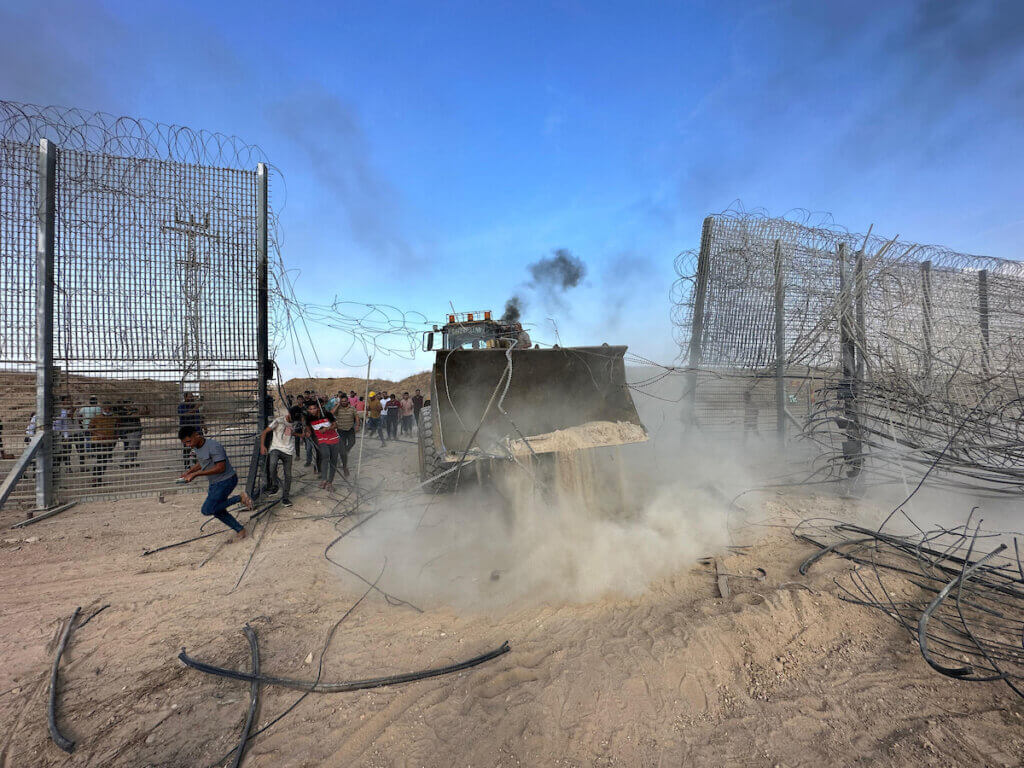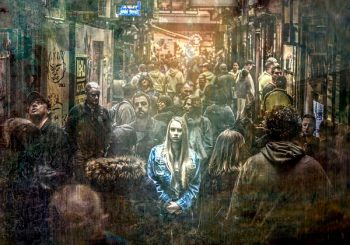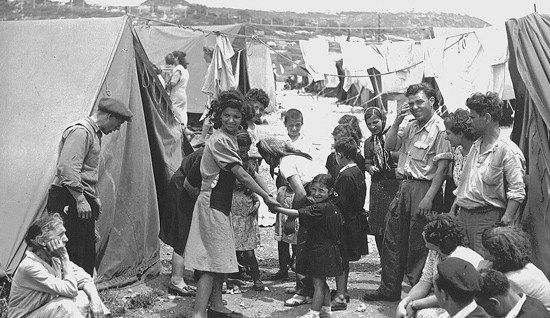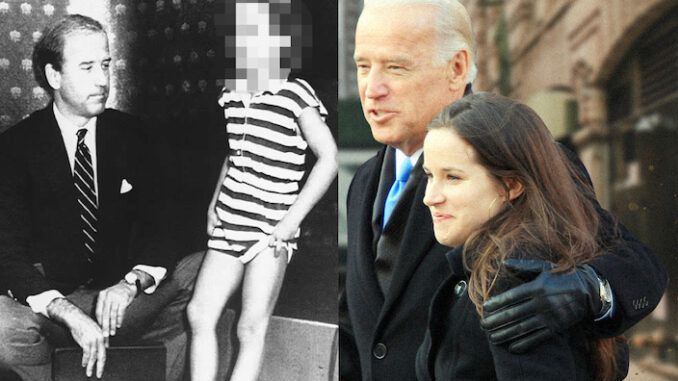I got into Gaza six months after the big massacre of 2008-2009, with Code Pink. It was one of the most scarring travels of my life– obviously. The people there were hungry for any attention from outsiders, that was my main impression. They were isolated from all of humanity, and tarred as terrorists. They were locked up, in the little strip that I calculated was smaller than Queens and the Bronx put together. They were all over us from start to finish, charming and desperate and articulate. They wanted a feeling of global community, that they too were participants in civilization. That was one thing we could do for them, make them feel less alone.
I looked at it Jewishly. I kept thinking about the Warsaw Ghetto and the photos of Roman Vishniac. His photos of the Warsaw Ghetto were reissued in the 1980s with a forward by Elie Wiesel in an oversized edition that became a bestseller in the Jewish community. The book has a special place in my family story because my mother never bought new books, she only bought stuff second-hand, so as to bring up six children on a professor’s salary, but she bought six new copies of that book, one for each child, so we would never forget. That was a big outlay of cash. My mother was somehow traumatized by the Holocaust. We knew of no relatives who had died– my grandfathers had come over at the turn of the century, as children — but when my mother was a girl, in a broken home in New York, the news from Europe had fused into her American experience of poverty and anti-Semitism and she had felt kin to all the Jews who were slaughtered, or in camps. She sometimes said that she had one child for each million. That’s an intense statement, but obviously it came from some real emotional place.
The destruction we saw in Gaza reminded me of those pictures of the Holocaust, and it came to me then what any sensitive person soon understands about Israel, that the Jews had needed to find a new Jew on whom to inflict the horrors that were inflicted on us by the Nazis. The cycle of abuse. And of course many Zionist leaders explicitly projected the Nazis on to the Palestinians.
We met health care professionals in Gaza, and one said, “We live in a cage, you can see that plainly. But the Israelis, they have a cage in their mind. They are more imprisoned than we are.”
These ideas are fresh to me this weekend because of the deep craziness of the Israeli violence on Friday. Consider this: On Thursday, April 5, the Israeli Ministry of Foreign Affairs sends out a long solemn message giving the Israeli position to skeptical foreign observers —
Dear foreign journalist, editor, commentator, diplomat, blogger,
If you are planning on covering and/or addressing events at the Gaza-Israel fence on Friday April 6–
then the next day Israeli snipers shoot six Palestinian journalists, killing one of them, at that very fence. It’s hard to be more crazy than that.
The journalist they killed, Yaser Murtaja, had never been out of Gaza and left as an epitaph the desire to travel. “My name is Yaser Murtaja. I am 30… I never traveled!” I might have met him nine years ago, winning and desperate and imprisoned.
All six journalists Israel shot were Palestinian. I bet that’s because none of the foreign journalists the Israeli ministry was so worried about dared to go near the fence. It was left to Palestinian journalists to carry out that courageous labor, because: they have no choice. The Palestinians are doubtless a deeply traumatized people today. You can’t experience so much violence without it distorting your view of reality, and your sense of your future. At 16, Ahed Tamimi had the courage to slap a heavily armed Israeli soldier occupying her property because a soldier had just shot her cousin and because she’s seen relatives die in front of her.
My chief interest is my people, the people I come from. Jews are deeply traumatized by one of the worst historical experiences that has ever befallen anyone, just 70 years ago. My mother’s best friend got out of Berlin at 8. After Kristallnacht her mother said to her father, If you won’t leave, I’m taking the kids myself. Golda ended up comfortable in Bloomington, Indiana, but she couldn’t handle that. She and her husband moved to Jerusalem in 1968 to be on the front lines for the Jewish nation and so their kids wouldn’t marry non-Jews in the U.S.. She discovered my writing on this site in 2012 and wrote to me, “Is your blog Mondoweiss a desperate attempt to make your name known (a result of your failure to do so in literature), or is it a byproduct of your unresolved conflict with your father? I want to cry. Golda.”
I was stunned and guilty. My wife wrote back to her before I was capable of doing so. “Personally, I couldn’t figure out whether your note was supposed to be cruel or just ignorant.”
Golda’s story, and her viciousness, and my guilt as a surrogate of one of the six millions, when my wife was strong — that’s just an eyedropper of Jewish trauma.
John Mearsheimer once asked me how the smartest and best educated and one of the most liberal and privileged people in America could blind themselves to apartheid. “That’s your story, Phil, you have to explain it.” My explanation in the light of the latest massacre is that the Jewish question of Europe never ended. Jews were so psychically scoured by that collective memory that we had to project our experience on to others, and we found a perfect other in the Palestinians.
Leaving aside the obvious political questions of isolating Israel and prosecuting commanders– Jews have to sort out our trauma. We need pressure from others, and some kindness; but the kids need to take control and work this out with the parents and grandparents, and soon. We owe that to the world.
Source Article from http://mondoweiss.net/2018/04/jews-and-trauma/
Related posts:
Views: 0
 RSS Feed
RSS Feed

















 April 9th, 2018
April 9th, 2018  Awake Goy
Awake Goy 




 Posted in
Posted in  Tags:
Tags: 
















